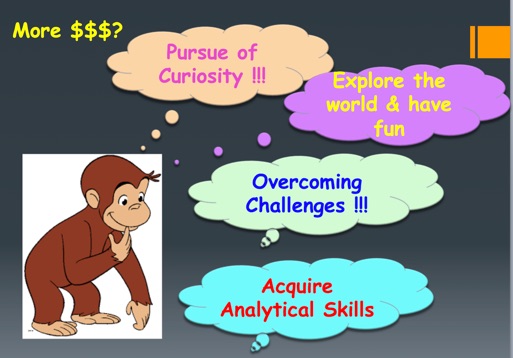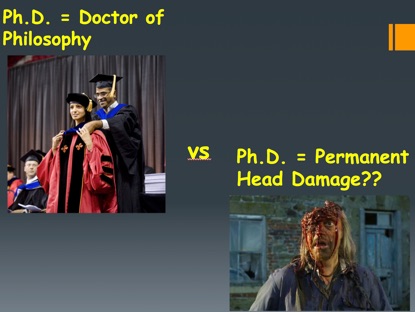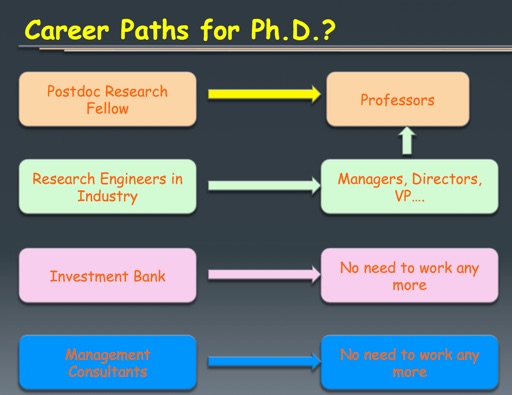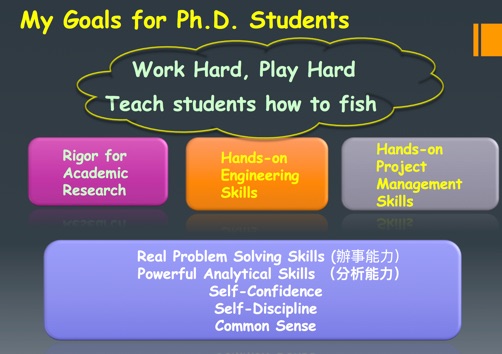
welcome
Why did I study for Ph.D.?




A list of courses a Ph.D. student in my team should take / sit in.
-
(1)MATH 301 Real Analysis
-
(2)ELEC 547 Convex Optimization (Fall Sem)
-
(3)ELEC 546 Advanced Wireless Communication Systems (Spring Sem)
-
(4)MATH 341 Stochastic Modeling
-
(5)MATH 541 Advanced Probability Theory I (Fall Sem)
-
(6)MATH 541 Advanced Probability Theory II (Spring Sem)
-
(7)MATH 545 Stochastic Process
-
(8)ELEC 549 Stochastic Learning or Stochastic Control and Portfolio Optimization

-
1)Excellent Ability of Comprehension of New Knowledge: During Ph.D. study, you need to grasp a lot of new knowledge or understand a paper quickly. As a result, the ability to self-study effectively to acquire whatever missing knowledge you might not have is critical. This ability is usually reflected by good GPA in UG studies (afterall, I am not saying UG results are not important).
-
2)Excellent Ability of Asking Questions:- As I mentioned, getting good UG GPA is only part of the equation. A more fundamental but critical requirement is the ability to ask good questions. Research is about finding answers but before you can create new knowledge, you got to recognize “what’s wrong with the existing results”. Your ability to discover problems is tightly related to your way of thinking. This is actually so fundamental that you cannot get this ability over night if you do not have it. (e.g. have you get used to asking questions during class?)
-
3)Excellent Ability of Communications:- Can you explain your ideas clearly? Are you able to communicate efficiently with people of different levels? (e.g. can you explain to somebody on the street what is CDMA?). Ideas have to be matched with words to form statements. Only when a statement is formed before it has the qualification to be called “right” or “wrong”! As explained below, I like to interact with students who can give me (a) technical confidence (安全感) [the statement / theorem / results generated from a student is correct] (b) efficient “top-down” communications: [I can grasp the top-level logic and skeleton quickly without the need to go through the unnecessary LOWEST LEVELS DETAILS]. This is also tightly coupled with #2 (your analytical and logical thinking ability) and is so fundamental that you cannot suddenly have this capability overnight if you do not have it now.

I worked in the industry for 3 years right after I finished by Bachelor. Life then was very good. Colorful life and good salary. Yet, after working for 3 years, I felt it’s time to pursue my curiosity in communications. In fact, I was not really sure if I should quit my job and explore the unknown. I talked to many of my friends and colleagues and most of the advice I got was “You must be crazy... “. “Can you really find a job after getting a Ph.D.?”..... At the end, I asked myself one question “Will you be starved to death after returning from Ph.D.?” and I answered “Probably not”... Based on that, I quitted my job and started this long journey of research career.
What can you do after getting a Ph.D.?

The answer really depends on how you do your Ph.D.


What is Ph.D. Study Like?
From time to time, there are students coming to do Ph.D. but with a mindset like UG students. They expect Ph.D. is like taking more advanced courses. This is completely wrong. Doing a Ph.D. is like playing a “survivor game” in a jungle of knowledge. It is YOU to play the game (not the supervisor). During the process, you will feel lost all the time and yet, you have to use your “wisdom” to explore your way out. You also have to sharpen your tools from time to time or else, you will be killed by some beasts or missed some good opportunities. Supervisor might occasionally point you some directions or give you some advice but it’s YOU to explore and struggle your way out. Why you want to play this game? You have no better things to do? Well, someone will enjoy it because it’s like a “challenge” to yourself (just like people like to run marathon).
My Goals for Ph.D. Students?

Do you consider getting a Ph.D. as a beginning or an end? Can a Ph.D. label really help you in your future career? In general, I do believe Ph.D. will help your future career... but not through its “label”. I believe if one could survive the process, he/she should have strong analytical skills and problem solving skills. Most importantly, he/she will have “magical” self-confidence to get things done even thought they have never tried that before. These attributes will be very important assets in your future career nomatter what career path you choose.

My Requirements on my Ph.D. Students
e.g. 1 [*****] “Prof, I have a bug in my simulation program... I don’t know how to solve the bug.. the result is simply not correct....”
e.g. 2 [****] “Prof, I cannot solve this equation... what should I do?”
e.g. 3 [**] “Prof, I got stuck with this optimization problem, what should I do?”
Scenario #1
There are several reasons I would feel mad. First of all, it is not possible for me to give an answer to these levels of questions unless i jump into your problem and dig as deep as you. In this case, this defeat the setting that the Ph.D. student as the “owner” of the problem. Second of all, these questions reflect that the student is just not independent enough. Yet, it does not mean the students should not ask me anything at all during the process. What sorts of questions will be appropriate?
e.g. “Prof, I cannot solve this equation. I searched through this and that and I believe this is not solvable. As a result, I suggest to get around this problem by this and that.... what do you think?”
e.g. “Prof, I got stuck with this optimization problem. It’s too complicated and does not have viable solution at all. I suspect there is some problem with the original formulation. In fact, we could have the following simplifications if we look at these asymptotic cases...etc... what do you think?”
e.g. “Prof, this approach of stochastic game simply does not work because we do not have knowledge on the global system state. In order to have completely decentralized design, we got to ..... I am looking at another possibility ..... what do you think?”
Scenario #2
These are examples of “good questions”. One important common features in these questions are... the students have spent efforts to think of alternatives and the way to get around the obstacles. In summary, I would enjoy / expect the discussion with Ph.D. students to be at a higher levels rather than nitty-gritty details. The discussion process should be like playing badminton or pingpong. Imagine a couch and a student practicing badminton. The process will be interesting if there is back-and-forth....Similarly, the process will be ridiculously boring if the ball is always dropped on the ground after one or two strokes....
